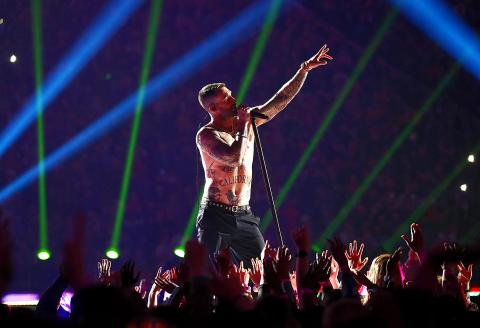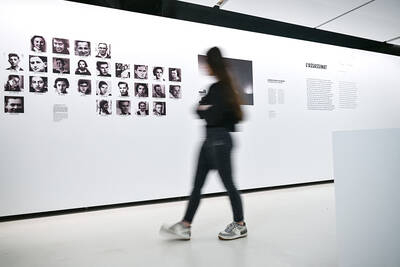US rock band Maroon 5 is in Taiwan on its fourth visit to the country. The group is set to stage a concert tonight at Kaohsiung’s National Stadium, which can accommodate over 50,000 fans. Tickets for what is to be its first ever gig in southern Taiwan are priced from NT$800 (US$26) to NT$5,800, and were sold out months ago.
Maroon 5 visited Taiwan in 2011, 2012 and 2015, and its shows were well received. The multiple Grammy Award-winning band was also invited to perform at the halftime show of the National Football League’s (NFL) 53rd Super Bowl on Feb. 3. The annual NFL championship is one of the most watched US TV shows.
Over 110,000 people had signed a petition for the band to drop out of the show to support Colin Kaepernick, former NFL quarterback who started “kneeling protests” during pre-game national anthem performances in 2016 to oppose racial injustice. His contract has not been renewed by the NFL since then.

Photo: EPA
照片:歐新社
(Eddy Chang, Taipei Times)
美國搖滾天團「魔力紅」四度訪台!該團預計今晚將在高雄市的國家體育場開唱,該場地可容納超過五萬名粉絲。這次在南台灣的首唱,票價從八百元(約二十六美元)到五千八百元,所有門票在數月前即銷售一空。
「魔力紅」曾於二○一一年、二○一二年、二○一五年訪台,演出大受觀眾好評。這個榮獲數座葛萊美獎的樂團,還受到國家美式足球聯盟(NFL)的邀請,於二月三日在第五十三屆「超級盃」中場秀演出,NFL每年的冠軍賽都是美國收視率最高的電視節目之一。
然而超過十一萬人發起一項連署請願,呼籲該團退出中場秀,以支持NFL的前任四分衛柯林卡柏尼克。他於二○一六年在賽前起立唱國歌時,發起「單膝跪地」的抗議以反對種族不公,自第二年起NFL即不再和他簽約。
(台北時報張聖恩)

Historians are rethinking the way the Holocaust is being presented in museums as the world marks the 80th anniversary of the liberation of the last Nazi concentration camps this month. Shocking images of the mass killings of Jews were “used massively at the end of World War II to show the violence of the Nazis,” historian Tal Bruttmann, a specialist on the Holocaust, told AFP. But in doing so “we kind of lost sight of the fact that is not normal to show” such graphic scenes of mass murder, of people being humiliated and dehumanized, he said. Up to this

A: Brazilian jiu-jitsu, known as “BJJ,” has become more and more popular. Even Hollywood stars like Halle Berry and Tom Hardy are obsessed with it. B: Some Asian stars, such as Taiwanese actor Eddie Peng and South Korean actor Lee Joon-gi, have also practiced this martial art. A: BJJ is not just a martial art, but also a combat sport. B: I’ve always wanted to try it, but I’m worried about getting injured. A: Diana Wang, a US doctor of physical therapy, is holding a BJJ seminar at PMA Brazilian Jiu-jitsu in Taipei Friday night. Let’s go check out how we

When people listen to music today, they typically use streaming services like YouTube or Spotify. However, traditional formats like vinyl records have regained popularity in recent times. Vinyl records are circular discs that store music in grooves on their surfaces and are played on a turntable. As the turntable’s needle runs along these grooves, it picks up vibrations and translates them into sound. The history of vinyl records dates back to the late 1800s, but material and technological challenges delayed mass production until the 1950s. Despite early versions having short playtimes and poor sound quality, vinyl records introduced a new era

A: Actually, Brazilian jiu-jitsu is particularly good for small people like you. B: Really? How so? A: According to Diana Wang, a US doctor of physical therapy, the BJJ’s purpose is to help smaller, weaker people defend themselves by using various techniques, such as leverage. B: That sounds interesting. What time does Dr Wang’s BJJ seminar begin tonight? A: The event is scheduled for 7:30pm at PMA Brazilian Jiu-jitsu in Taipei. Admission is free, but donations are welcome. A: 其實你的個子比較小,很適合練巴西柔術呢。 B: 真的嗎?為什麼? A: 據美國理療醫師王幼瑞博士說,巴西柔術的概念是讓弱小的人,也能利用槓桿作用等技巧防身。 B: 真有趣,王醫師的巴柔研討會幾點開始? A: 今晚7點半在「台北巴柔運動館」,免費入場自由樂捐唷! (By Eddy Chang, Taipei Times/台北時報張迪)